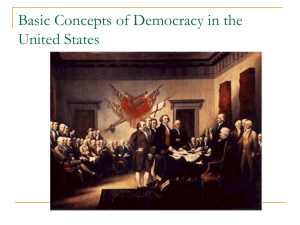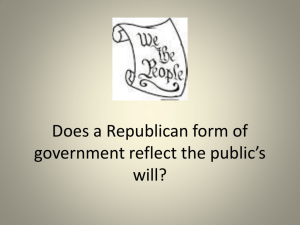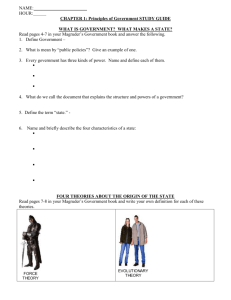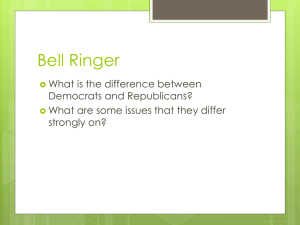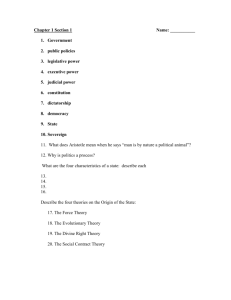Principles of Government
advertisement
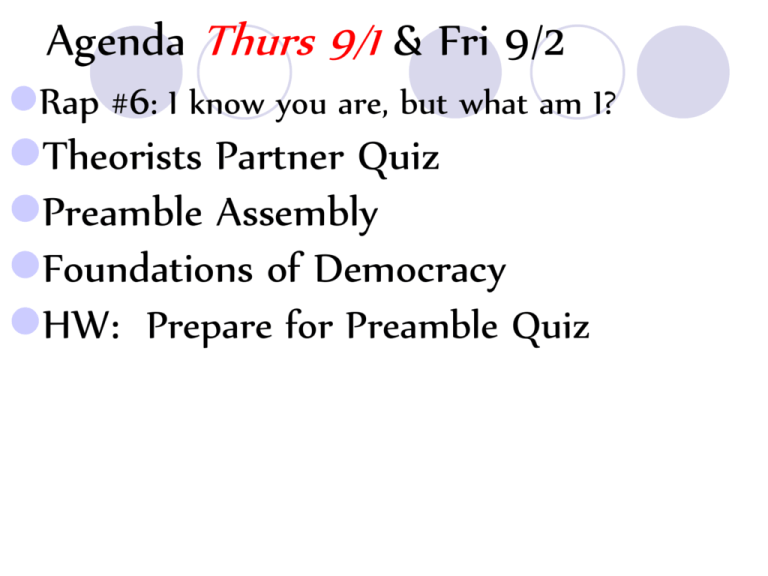
Agenda Thurs 9/1 & Fri 9/2 Rap #6: I know you are, but what am I? Theorists Partner Quiz Preamble Assembly Foundations of Democracy HW: Prepare for Preamble Quiz Rap #6: I know you are, but what am I? “You can only be free if I am free.” --Clarence Darrow What does this quote mean to you? How has it applied historically? How does it apply today? Theorists Quiz You and your partner prepare to be quizzed. When ready, raise hands for oral quiz. Each person must answer 2 questions correctly for a total of 50 points. You get one “mulligan” (Whoopsie-daisy, do-over) w/ no penalty. Each time you are quizzed, you lose 5 points after your initial do-over when you don’t get all ?s correct. Once you and your partner have passed, you can quiz others! Purpose of Government Preamble Assembly Everyone turn to page 8 or 760 and read the Preamble to the Constitution aloud! Each group is assigned one aspect from Preamble to illustrate Write out phrase from Preamble on top of poster Affix or draw pictures depicting the meaning / purpose of that aspect of the Preamble Purpose of Government Preamble outlines why our government exists! To form a more perfect union Working out the kinks Making sure the country runs efficiently To Establish Justice Create, enforce, and interpret law Being reasonable, fair, and impartial Social Justice Purpose of Government Ensure domestic tranquility Keeping things calm at home (order) Preventing riots, human rights abuses, etc Provide for the common defense Defense against other countries Foreign Policy Purpose of Government Promote the general welfare Do what is best for everyone Government is a civil servant Welfare programs = schools, etc. Secure the blessings of liberty Freedom is maintained Constantly tested by the government Basic Concepts of Democracy Chp 1 Sec 3 Democracy Democracy exists because of the assumption of basic principles Democracy is not a common form of government and is dependent upon certain concepts “Democracy is the recurrent suspicion that more than half of the people are right more than half of the time.” --E.B. White The 5 Foundations of Democracy 1. Fundamental worth of the individual Democracy insists that each person’s worth and dignity be recognized and respected by all other individuals, and by society, at all times. 2. Equality of all persons equality of opportunity & equality before the law Fundamental Worth of the Individual Each person no matter what their job, class, gender, race is an individual and should be respected How is this different than in a monarchy or communist system? Equality of all Persons This is related to the worth of the individual As individuals we are all equal This is the one we have had the most trouble with! This does not mean we are all the same but are privy to the same opportunities! Ex: The right to pass or fail The 5 Foundations of Democracy 3.Majority rule and minority rights The majority must always recognize the right of any minority to become, by fair and lawful means the majority. The majority must be willing to listen to a minority’s argument, to hear its objections, to bear its criticisms, and to welcome its suggestions. Majority Rule and Minority Rights If the power is in the hands of the people then they make the decisions Decisions are not unanimous but based on the desire of the majority Because the majority has the power they must take special care to not discriminate or oppress minorities Ex: The majority cannot decide to unlawfully prison the minority The 5 Foundations of Democracy 4.Necessity of Compromise Not all compromises are good. Puts the individual first but insists that that each individual is equal. 5. Individual freedom Absolute freedom would end in anarchy. Necessity of Compromise All opinions are considered equal, just as individuals are considered equal Because of this assumption of equality there has to be a give and take or compromise Without compromise the country would never make any decisions Some things are above compromise Ex: Freedom for all US citizens Individual Freedom In a democracy there can never be complete freedom… that would be anarchy and was forfeited under social contract theory You are free to do the things that don’t effect others A democratic government must find the balance between freedom and authority References McClenaghan, W. (2006). Magruder’s American Government. Boston, MA: Prentice Hall.
